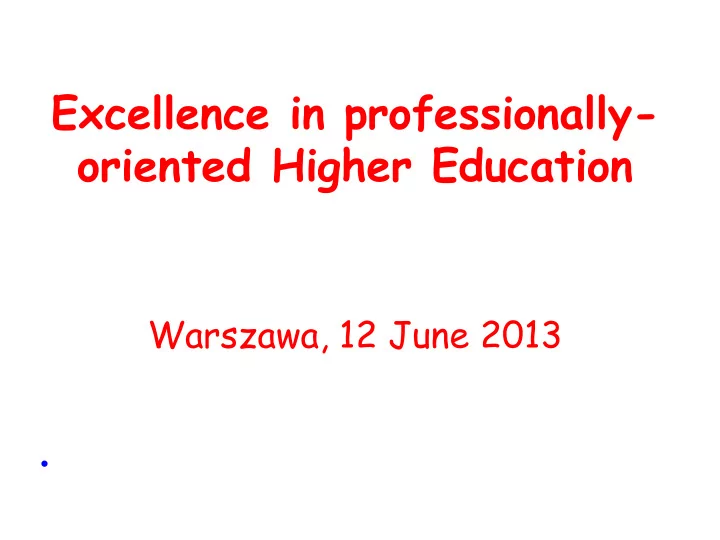

Excellence in professionally- oriented Higher Education Warszawa, 12 June 2013 •
Quo vadis , professional higher education? Guy HAUG, expert on the EHEA Valencia/Brussels •
A key sector within HE systems … Strong professionally-oriented HE is vital: ● for the HE sector, as a complement and substitute to university education • for the professional education sector, as the top end of the sector → Many advanced countries have developed a strong professionally-oriented HE sector alongside their university sector: Germany, Austria, Switzerland, Netherlands, Belgium, Finland, + e.g. USA and Canada. → Qualifications are mostly at levels 5, 6 and 7 of EQF
… for diversity and social efficiency The role of HE in society is stronger when: • it reflects the variety of qualifications needed on the labour market; • the diversity of aptitudes and talent of individuals can flourish and is recognised. → Monolithic university systems tend to offer a single academic menu targeted at the best young learners – not at LLL and non-traditional students. → Professional education confined to the lower levels of qualification cannot gain status in society and tends to be seen as inferior and little attractive.
… for relevance and employability Evidence shows that the Knowledge Economy and Society hinges on a high level of education and training of the workforce. It also shows that this principle does not apply irrespective of the type and quality of HE available to the population: high quality university education is indispensable, but… → Monolithic HE systems may well lead to a combination of unemployment of university graduates and a shortage of qualified technicians – a common feature in various European countries.
… for social integration and equity Professionally-oriented HE tends to be shorter and more «concrete», hence more understandable and accessible for students from families without university education and long term financial visibility. High quality and investments in public professional education at all levels are steps towards social integration and social equity. → When society pays for (a large share of) long education programmes attended by students from better-off background, and invests comparatively less in shorter professional/vocational education, social equity is at risk and taxation may well become regressive.
… for the sustainability of public HE There is growing concern about the sustainability of public funding of massified university systems focussed on long academic programmes. This has already led to serious concern about quality and to severe budget cuts in several countries. → In times of crisis, professionally-oriented HE may be simultaneously a means to improve: the relevance and responsiveness of the HE system as a whole; the sustainability of public funding; and social equity, including in the form of lower youth unemployment.
In professionally-oriented HE, success and excellence hinge on: • Dignity , as perceived in society • Autonomy (versus the university sector) • Continuity to top levels (no dead-ends !) • Relevance , in region and economy • Quality (of investments and learning)
DIGNITY Professionally-oriented HE should: • Not be confined to lower levels of QF • Not be reserved to unsuccessful students in mainstream education: negative selection is a major impediment to successful professional education at all levels • Have an positive name (not «non-university») for itself and its degrees/titles • Have one (or a few) emblematic HEIs as tip of system (e.g. CNAM, INACAP) • Enjoy visible sponsorship of leading business firms.
AUTONOMY Professionally-oriented HE should: • Enjoy a high degree of autonomy and build up its own profile, different from that of universities • Have its own facilities and teaching staff, not selected according to university criteria, with real career perspectives rewarding effective teaching and applied research. • Develop active teaching/learning methods suitable for young and adult learners and open to region/industry • Yet, maintain fair and disclosed loops into and FROM university.
CONTINUITY TO TOP LEVEL Professionally-oriented HE should: • Always offer access to higher levels: - no dead ends - professional degrees up until highest levels: one/two-year programmes, but also professional degrees, masters and even doctorates • Organise two-way mobility with university, e.g. by means of cooperation or «association» agreements • Be widely open to LLL, with a solid system of Recognition of Prior Learning
SOCIAL/ECONOMIC RELEVANCE Professionally-oriented HE should: • Be recognised for its economic and regional relevance • Have cooperation with industry/region as basic principle for all its activities (needs identification, design and implementation of programmes, internships, lecturers, etc.) • Build-up strong Continuing Education • Seek sponsorship and funding from industry
HIGH, RECOGNISED QUALITY Professionally-oriented HE should: • Benefit from adequate funding, because of its economic impact, lower cost/unit and for social equity • Offer high quality learning facilities/equipment • Pay due attention to transversal skills and international outlook, in addition to technical skills • Have access to a trusted QA agency and to quality seals (or « accreditation ») with national/international visibility for all levels of programmes • Participate in international exchange schemes, joint qualifications and networks (e.g. Businet, EURASHE, Dublin and Sydney Accords, etc.)
Dziękuję za uwagę Thank you for your attention
Recommend
More recommend